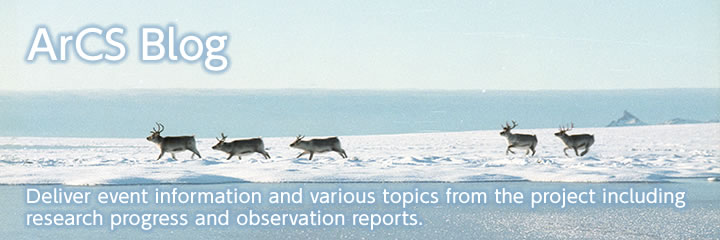Third debriefing session of the program for overseas visits by young researchers was held in the Yokohama Institute in JAMSTEC on 22 April 2019.

I stayed at National Oceanic and Atmospheric Administration (NOAA) in Seattle from 8 April to 13 April in 2019 with funding from the ArCS program for overseas visits by young researchers. The purpose of my visit was to learn techniques on identification of ichthyoplankton in the northern Bering Sea.
I stayed at Woods Hole Oceanographic Institution (WHOI) from 13th February to 14th April with support from the ArCS’ program for young researchers’ overseas visits.
During my stay, I got sediment samples taken by Healy, an icebreaker ship of United States, and investigated diatom resting stage cells in sediments of the northern Bering Sea, Chukchi and Beaufort Seas. Diatom resting stage cells are like “seeds” which have high durability. They are formed under nutrient- and light-limited conditions.
Second round-table conference on Arctic between government officials and researchers was held on Monday, 10th June 2019.
There were about 30 participants consisting of about 20 researchers, mainly from ArCS participants, and 10 government officials from the Cabinet Office, the Ministry of Foreign Affairs, MEXT and other ministries.
The regular meeting of SDWG was held at Rovaniemi in Finland on October 29-30, 2018, under the Finish chairmanship. About 90 representatives gathered from about 16 countries and 15 organizations. During this meeting, representatives from each SDWG projects updated their ongoing works according to thematic category of SDWG projects.
We conducted public relation activities during the Japan Geoscience Union (JpGU) 2019 Meeting which was held from 26th to 30th May, 2019 at Makuhari Messe, Chiba.
ArCS project’s 2019 plenary meeting was held at Miyoshi Memorial Auditorium and foyer, JAMSTEC Yokohama Institute for Earth Sciences on Monday, 22nd and Tuesday, 23rd May 2019. The event was attended by around 90 participants.
In order to face and respond to the global warming and related change in the Arctic, action should be taken not only by way of natural science, engineering science, and social science individually, but also by integrating approach. On the basis of this, the symposium had been carried out by researchers from two research fields as natural/engineering science (Theme-1; working on “Predictability study on weather and sea-ice forecasts linked with user engagement”) and social science (Theme-7 working on “People and Community in the Arctic: Possibility of Sustainable Development”) from the ArCS Project together.
Northeast Asia is one of the coldest regions of human geographical distribution on our planet and is home to the Pole of Cold in northern hemisphere. How did the human population adapt the harsh environment, in light of hominoid biological evolution having occurred in tropical Africa? The key for survival was the cultural adaptation. Human behaviors and notions formed and changed as a result of the human-environment interaction involving the migrating peoples; these included environmental perception, tool making and foraging capacities, animal domestication, social organizations, and belief-ideology systems. Human cultural adaptation is not simple irreversible environmental determinism, but a series of complex evolutional phenomena controlled by the probabilities of a given socio-ecological system. Based on the above concerns this program aims to provide an exchange of knowledge in international academic collaboration, bringing together geochemistry, ecology, history and anthropology of Northeast Asia and developing a new methodology of area studies.
A result of international collaborative research on Arctic legal and policy study under ArCS Theme 7 has been published on April 17, 2019: Emerging Legal Orders in the Arctic: The Role of Non-Arctic Actors, co-edited by Professor Akiho Shibata, Director of the Polar Cooperation Research Centre (PCRC), Kobe University, and three early-career international scholars at PCRC. This is the first volume of a new series: Routledge Research on Polar Law.




